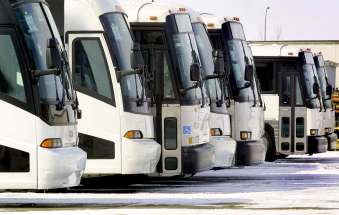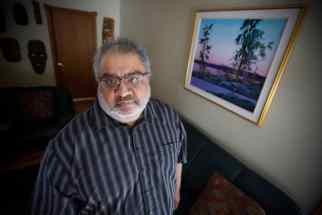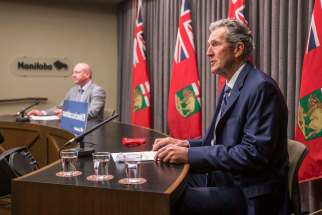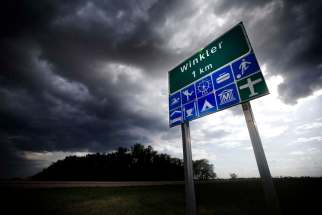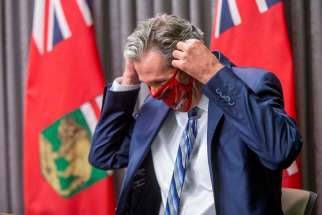Doctor fears 100 ICU patients to be transferred out of Manitoba in third wave
Read this article for free:
or
Already have an account? Log in here »
To continue reading, please subscribe:
Monthly Digital Subscription
$0 for the first 4 weeks*
- Enjoy unlimited reading on winnipegfreepress.com
- Read the E-Edition, our digital replica newspaper
- Access News Break, our award-winning app
- Play interactive puzzles
*No charge for 4 weeks then price increases to the regular rate of $19.00 plus GST every four weeks. Offer available to new and qualified returning subscribers only. Cancel any time.
Monthly Digital Subscription
$4.75/week*
- Enjoy unlimited reading on winnipegfreepress.com
- Read the E-Edition, our digital replica newspaper
- Access News Break, our award-winning app
- Play interactive puzzles
*Billed as $19 plus GST every four weeks. Cancel any time.
To continue reading, please subscribe:
Add Free Press access to your Brandon Sun subscription for only an additional
$1 for the first 4 weeks*
*Your next subscription payment will increase by $1.00 and you will be charged $16.99 plus GST for four weeks. After four weeks, your payment will increase to $23.99 plus GST every four weeks.
Read unlimited articles for free today:
or
Already have an account? Log in here »
Hey there, time traveller!
This article was published 27/05/2021 (1657 days ago), so information in it may no longer be current.
As 25 COVID-19 patients from Manitoba fought for their lives in Ontario hospitals Thursday, an ICU physician warned Manitobans to expect four times as many to be flown out of province over the next three weeks.
“We’ve been averaging four per day,” Dr. Anand Kumar said Thursday, as Manitoba reported 297 new cases of COVID-19 and eight more deaths.
“It wouldn’t surprise me if we approach 100 patients,” Kumar said during a day off from being on call 24/7 at Health Sciences Centre. “It’s a pretty surreal situation.” A rise in COVID-19 transmission, with close to 300 daily cases, has overwhelmed intensive care units in Manitoba.
On Wednesday, three critically ill COVID-19 patients from Manitoba were transported to Ontario hospitals — in Ottawa, Peterborough and Woodstock — and one patient in Owen Sound was returned to Manitoba and placed in a medicine unit because they no longer required critical care.

Since May 18, a total of 26 critically ill COVID-19 patients have been transported to Ontario. On Thursday, 25 Manitoba ICU patients were being treated in Ontario.
Additional COVID-19 patients in ICU were tentatively scheduled for transfer Thursday to Ontario and, for the first time, to Saskatchewan. A Shared Health spokesman said late in the day that they won’t release the number of patients transferred until their transport has occurred.
Kumar said the out-of-province flights are arranged by Shared Health and provided by a variety of carriers with trained staff — but they can’t replace the government-run LifeFlight service that was dissolved by the Tories.
“You prefer to work with those who do that work all the time,” said Kumar. Working with transport teams from other provinces and private outfits “we may not have worked with in the past, creates some concerns.”
“It wouldn’t surprise me if we approach 100 patients. It’s a pretty surreal situation.”
– Dr. Anand Kumar
Kumar, who has worked in other Canadian and U.S. cities says “Lifeflight was wonderful — probably the best in North America.” Now, during a crisis, with Manitoba shipping ICU patients out of province on a daily basis, it is especially missed, Kumar said.
“I think it would be a big help. They were a very professional organization — there was nothing fly-by-night about them.”
Former LifeFlight medical director Renate Singh said LifeFlight was dissolved in the summer of 2019 after persistent staffing challenges, largely believed to be caused by government funding cuts. The government-run service transported patients out of province for procedures such as transplants and certain pediatric surgeries, she said.
Premier promises answers

Premier Brian Pallister has promised to get answers for the family of a critically ill woman with COVID-19 who died after an attempt to transfer her to an out-of-province hospital.
“There are many friends and family who are going to miss this woman,” Pallister said during question period Thursday when he was asked why the decision was made to move her to Ontario.
She’s been identified as 31-year-old Krystal Mousseau of Ebb and Flow First Nation, by the organization that represents First Nations in southern Manitoba.
Premier Brian Pallister has promised to get answers for the family of a critically ill woman with COVID-19 who died after an attempt to transfer her to an out-of-province hospital.
“There are many friends and family who are going to miss this woman,” Pallister said during question period Thursday when he was asked why the decision was made to move her to Ontario.
She’s been identified as 31-year-old Krystal Mousseau of Ebb and Flow First Nation, by the organization that represents First Nations in southern Manitoba.
The mother of two was being transported to Ontario Sunday and destabilized before the flight took off. She was returned to the Brandon hospital and died the following day.
“Krystal’s death is one more tragic life taken by a pandemic that has impacted First Nations citizens and communities disproportionately,” Grand Chief Jerry Daniels of the Southern Chiefs Organization said in a release.
NDP Leader Wab Kinew said Thursday he spoke with Mousseau’s daughters and other family members on Wednesday night.
“It’s very sobering when you have that conversation,” he said. “This is not about partisanship. This is not about politics. This is about a situation where we have dozens of Manitobans being sent out of province. We’ve seen, unfortunately, at least one of those attempts end with tragic results.”
Kinew said Mousseau’s family didn’t consent to her being transferred; during question period Thursday he asked Pallister about the decision to move Mousseau.
“We’ll find out what the process is. I don’t know what the process is,” the premier responded, offering condolences to Mousseau’s loved ones.
Kinew wanted to know if Shared health is conducting a critical incident review and if the chief medical examiner will hold an inquest so the family’s questions about the transfer and her death are answered.
“I do agree that answers to the specifics of the incident and any potential human error or mechanical malfunction should be addressed and made available to the family,” Pallister said in response.
“At the end of the day, we have a family in mourning in a situation where we’re asking ‘was this preventable?'” Kinew told reporters.
— Carol Sanders, with files from Canadian Press
“LifeFlight Manitoba Air Ambulance would fly those patients out back in the day when we had staff for two jets,” Singh said. “We haven’t really had the capacity to do that at LifeFlight on a regular, predictable basis since 2016 — that’s when the cuts started.”
Shared Health is now in charge of all patient transport. It has contracted STARS for intra-provincial transport, with out-of-province transfer done by a combination of Shared Health transport staff, the only LifeFlight nurse who was not let go, and advanced practice respiratory therapists, Singh said.
“Sending patients out of province historically has not been done because we’re short of beds,” said Singh. “This is an unprecedented number of out-of-province transports that are the result of our ICU capacity being overwhelmed.”
Until the recent health-care crisis, critically ill patients who needed air transport were most often those coming to Winnipeg ICUs from northern Manitoba. Now, with ICUs full, deciding which patients can be flown out of province to make room for more is an issue.
NDP Leader Wab Kinew called on the province Thursday to publish the protocol being used to determine which patients are moved, and whether there’s informed consent required from their families.
“Transporting ICU patients to Ontario is definitely new for Manitoba, but transporting critically ill patients is not new, and assessing a patient for transport stability is not new,” Dr. Perry Gray, Shared Health’s incident command planning lead said at a press conference earlier in the week.
“No science is exact, no science is perfect, no decision-making is perfect,” he said Tuesday.
“For sure, we would much rather keep everybody where they are, but (if) it is in the patient’s best interest to move them and I feel very comfortable, you know, we are picking that middle ground (neither the sickest nor the least sick who not likely to need critical care for much longer). “These aren’t the riskiest transports ever done in Manitoba compared to some of the others that are part of our standard procedure.”
Usually when someone outside of Winnipeg or Brandon needs an ICU bed, they have no choice but to transport them. Gray said transporting COVID-19 patients is a bit of an advantage because they can choose who to send out of province.
“We have a bit of an advantage over that situation with COVID patients because we don’t have to transport everybody with COVID. So actually in some ways, it’s less onerous and less concerning than when you absolutely don’t have an ICU and you’re in rural Manitoba and you have to transport someone. We can’t pick those middle patients.”
He didn’t mention whether or not families’ approval with their loved one being shipped out of province is taken into consideration.
“In normal circumstances, we do everything we can to get consent from the family,” said Kumar. Now is not a normal time. “This situation is different.” He said doctors expect to be given a mandate from the province shortly to allow for involuntary transfers, if needed.
No one from the province or Shared Health responded to a request for comment about providing doctors with the mandate for involuntary transfers.
— with files from Katie May and Julia-Simone Rutgers
carol.sanders@freepress.mb.ca

Our newsroom depends on a growing audience of readers to power our journalism. If you are not a paid reader, please consider becoming a subscriber.
Our newsroom depends on its audience of readers to power our journalism. Thank you for your support.

